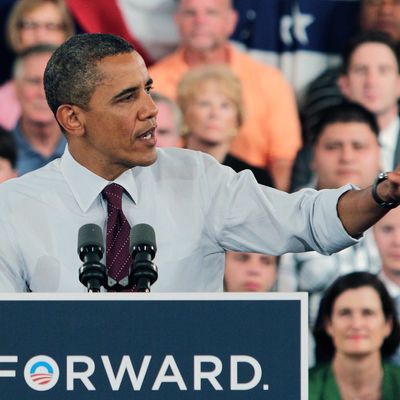
The clear and obvious takeaway from the “you didn’t build that” controversy is that it’s another instance of a campaign seizing on its opponent’s mangled syntax to accuse him of believing something he clearly does not believe. There have been several of these episodes already — “you people” being the most recent — and there will undoubtedly be several more.
To the extent that this latest gaffe debate reveals Something Larger, it’s the extraordinary hypersensivity surrounding the egos of the rich in our current political culture. The best analogy I can think of is the touchiness surrounding race and gender in the political microclimate of Ann Arbor (and other left-leaning academic environs) when I attended college in the earlier nineties. My first professional article was an account of a sociology professor who was suspended from teaching his course because he outraged his students by showing them statistics that, while true, offended them — for instance, he noted that male/female earning differential could be partially explained by certain factors. (I sold the article to Reason for $500, which financed an entire summer of goofing off.) The general prevailing sentiment was that racism and sexism were such pervasive forces that any level of insensitivity on the subjects was impermissible. The slightest deviation from the approved pieties had to be couched in apologetics.
The status of the rich in our national debate today bears more than a passing resemblance. Conservatives see them, and many of the rich see themselves, as a persecuted minority helplessly outvoted by the middle-class hordes, and this sense of persecution can exist wildly out of proportion to any reality. Like the campus left, conservatives have developed a whole terminology — i.e., “class warfare” — to treat any discussion of subjects they prefer to avoid as a kind of hate speech. When Romney allowed that discussions of inequality ought not to be completely forbidden, but could conceivably be permitted if confined to “quiet rooms,” he was expressing this same belief.
It’s completely obvious from the context of Obama’s remarks that he was trying to say that rich people did not build roads and other infrastructure, not that they did not build their own business. Rather than defend Romney’s obvious distortion, conservatives like Jim Geraghty, James Pethokoukis, Philip Klein, and J.D. Tucille take issue with what Obama was actually trying to say: that rich people did not get rich solely due to their own talent and hard work, that, to varying degrees, they owe some of their success to good fortune and the contributions of government. They are expressing the genuine outrage of the right that lies beneath the trumped-up outrage peddled by Romney.
The outrage is that Obama would, even in the course of hailing the contributions and achievements of the rich, introduce context that in some way minimizes them. Nobody actually disputes Obama’s claim that government contributes some measure toward the success of business owners. They concede it is true, even banally so. Conservatives, nonetheless, feel angry that he would verbalize it. “Maybe Obama doesn’t understand how damaging and corrosive these sorts of statements and speeches, repeated over and over, might potentially be?,” writes Pethokoukis. “There’s something deeply disturbing in the world-view of those who would minimize the achievements of those who pursued the ideas, took the risks, invested the time and money and made things happen,” insists Tucille.
In other words, they are outraged that Obama is being insensitive toward the rich. They don’t use the exact term, because it’s a piece of phraseology associated with the left rather than the right, but it’s exactly what they mean.
The existence of this controversy offers an interesting window into the protected status of the rich. Republicans have embraced a vocabulary – calling the rich “job creators” and dividing society into “makers and takers” – that implies an extremist moral logic of market absolutism. Even mild, measured rebuttals provoke squeals of outrage. This is not limited to the political right: Even in publications like the New York Times, the complaints of rich people who feel belittled or victimized by Obama have probably received more media attention over the last four years than have, say, the collective plight of the 50 million Americans lacking health insurance. The massive economic privileges that have accrued to the rich have given rise to a widespread belief that they must also enjoy a protective cocoon of political correctness.






























